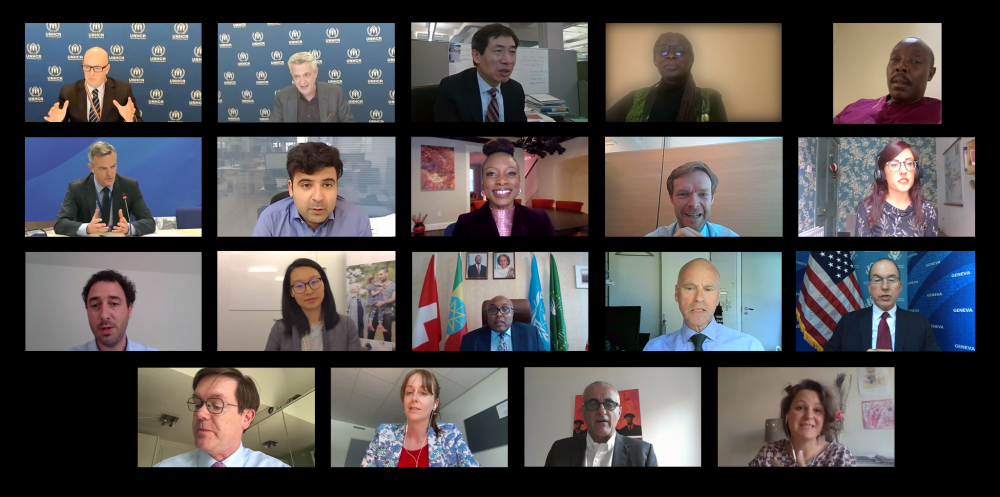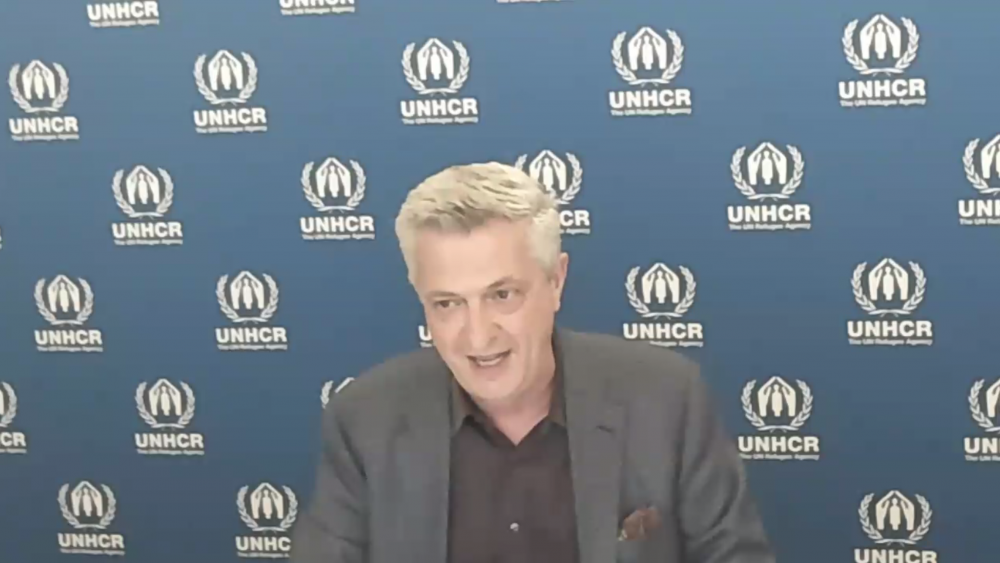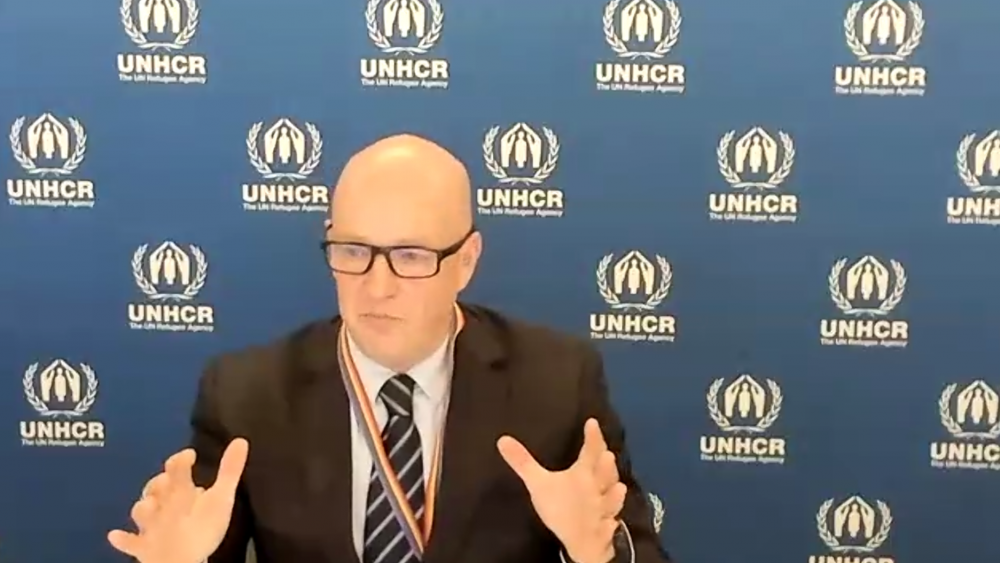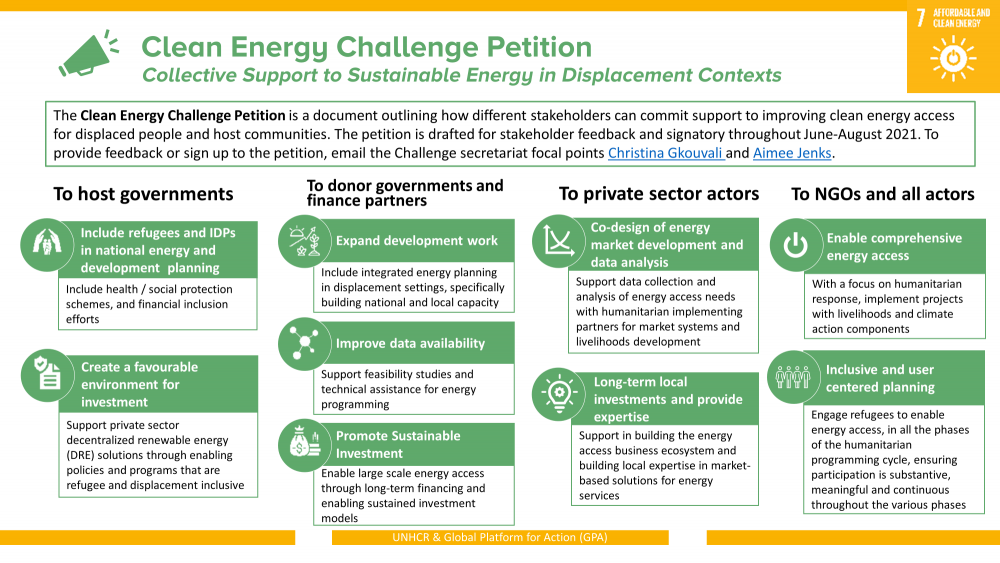In this section
In this sectionOn 3 June, the Secretariat of the Clean Energy Challenge convened governments, UN agencies, international/national NGOs, private sector, financing organizations, philanthropies, and academia to discuss Clean and safe energy in refugee settings. The high-level event was organized to create momentum on the key energy pledges made at the Global Refugee Forum in 2019. The speakers and panelists at the event highlighted how clean energy projects were already transforming the lives of refugees and local populations, and present opportunities for further support. There was a call to action to anchor clean energy for refugees to the global climate agenda and contribute to the High-level Dialogue on Energy in 2021.
The UN High Commissioner for Refugees, Fillipo Grandi, mentioned that Energy in humanitarian settings was often overlooked and change was needed. He said, “Providing refugees with safe and sustainable energy is an act of protection”. He also emphasized on collaborative approach to ensure refugees and host communities have access to safe, clean and sustainable energy. He called all the concerned stakeholders to come forward, saying, “to achieve this we need resources and expertise from any corners of society, in the true spirit of the Global Compact on Refugees. Engage with the Clean Energy Challenge to achieve the ambitious goal of providing displaced populations and their hosts with clean, sustainable energy by 2030."
Haoliang Xu, UN Assistant Secretary General, UNDP Assistant Administrator and Director of Bureau for Policy and Programme Support, vouched for humanitarian-development nexus in achieving Sustainable Development Goals (SDGs). “I believe the development actors that have expertise in energy and livelihoods can do more and we should increase our efforts to support the humanitarian sector in this. We need to integrate refugees and other displaced people in national energy and development plans in order to achieve SDG 7 and make sure we do not leave anyone behind, especially the most vulnerable”, he mentioned.
To ensure refugee voices are heard and present in high-level dialogues, the Clean Energy Challenge Secretariate invited Joelle Hangi, Director and Co-founder of Refugee Artist and Authors, who lived in Kakuma refugee camp in Kenya. She shared her story and stories of many other refugees. She explained to the panelists and the audience how important Energy is and how it could be life-changing for refugees. Agreeing to the importance, Robert Kasande, the Permanent Secretary of the Ministry of Energy and Mineral Development in Uganda, mentioned that his country had included refugees into their energy strategy and asked for support in realizing the energy strategy and increase access to energy to refugee population in Uganda.
“There is a sense of urgency. Action needs to be taken now to reduce the environmental impact of humanitarian aid. We need to scale up, we need to speed up, and we need to do it quickly”, highlighted by Hans Das, Director for Emergency Management, DG ECHO, EU Commission. Affirming the urgent need in this area, the CEO of Bboxx, Mansoor Hamayun mentioned that “there is a huge potential for market-based energy solutions” and invited private companies to engage in taking up the challenge.
The UNHCR Special Advisor on Climate Action, Andrew Harper, concluded the event addressing at how access to energy is closely interlinked with climate change. “There is increasing recognition of the dire needs of this planet, as well as of the needs of the populations that are most vulnerable to climate change. At the same time there is technology out there that did not exist twenty years ago. We can address the climate change challenges, but we can only do it together”, he mentioned.
The high-level event also invited speakers from several Donor governments, Refugee hosting governments, private companies, NGOs and philanthropies. The speakers confirmed their support in clean energy challenge and encouraged different stakeholders for continuous contribution to achieve SDG7 for displaced populations. In addition to the speakers mentioned above, the panel discussions included Thomas Fohgrub, Head of Coordination Unit, Global Platform for Action on Sustainable Energy in Displacement Settings; Cecilia Ragazzi, Access to Energy Lead and Senior Advisor, Mercy Corps; Alexander Haack, Global Team Lead for Energizing Development, GIZ; Irene Sun, Senior Innovative Finance Officer, UNHCR. There were also several interventions from the floor where several organizations and governments expressed their support and willingness to contribute. They included Mission of the Federal Democratic Republic of Ethiopia to the United Nations, Norwegian Ministry of Foreign Affairs, U.S. Mission to the United Nations, Permanent Mission of Germany, Swedish Mission Geneva; and IKEA Foundation.
The panel sessions were moderated by Femi Oke, Co-founder of Moderate The Panel, and participated by 450 individuals coming from different organizations around the world. Find details and recorded video of the event here. Several organizations are looking for your support, click here to know about ready-to-go projects. Sign up to the Clean Energy Challenge Petition.
Last updated: 22/06/2021





